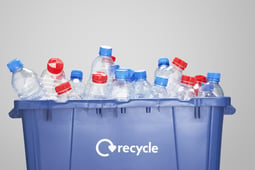 As sustainability concerns continue to remain at the forefront of packaging decisions, particularly in the plastics industry, recycling plays an increasingly important role in the effort to reduce packaging discards and overall solid waste levels - and business and brand owners can help make a difference by setting an example in the workplace. The following is a guest post from our friends at Northern California Compactors, Inc. outlining 5 major benefits plastic recycling can have on our environment:
As sustainability concerns continue to remain at the forefront of packaging decisions, particularly in the plastics industry, recycling plays an increasingly important role in the effort to reduce packaging discards and overall solid waste levels - and business and brand owners can help make a difference by setting an example in the workplace. The following is a guest post from our friends at Northern California Compactors, Inc. outlining 5 major benefits plastic recycling can have on our environment:
Plastic is a versatile material which has afforded us many benefits in regards to helping us live a clean, healthy and efficient lifestyle. However, a plastic parts lifecycle doesn’t end when it is put in the garbage can or recycling bin. The act of recycling plastics can make a considerable difference and it is crucial for consumers to understand the positive effect of recycling on the environmental and economic front. Consumers of plastic products have the opportunity to make a difference, and corporations and brand owners can lead the charge. With an appropriate plastic recycling approach, businesses can reduce hazardous waste output, cut expenses on waste management, and generate profits by selling recycled plastic products which are gradually gaining demand in various markets. Here are 5 significant advantages of plastic recycling for businesses to consider:
- Reduces Pollution Across Ecosystems
Greenhouse gases are a major reason for the increasing pollution levels in our environment. They are the driving factor behind climate change – a pressing issue which the whole world is striving to mitigate today. During the manufacturing of plastics, petroleum is burnt in turn producing greenhouse gases. Recycling plastic instead of manufacturing it from scratch hence indirectly reduces emission of hazardous greenhouse gases.
Plastic waste besides contaminating land, water and soil with harmful chemicals, is also responsible for death of thousands of animals on land, in water and in sea due to ingestion. Recycling plastic means reduced quantum of plastic waste. This in turn reduces pollution and saves a lot of animal species crucial to the food chain. - Requires Less Energy and Helps Conserve Natural Resources
Manufacturing of plastic from scratch requires much more energy compared to producing products from recycled plastic. The energy saved can be used for other important requirements in the economy. Also, the manufacturing process requires natural resources such as water, petroleum, natural gas and coal as raw material. Hence, plastic recycling saves precious natural resources. For example, petroleum, which is crucial for making new plastic products is - around 40% of petroleum consumption can be reduced by simply recycling discarded and old plastic waste. - Saves Fast-depleting Landfill Space
Landfill sites are fast diminishing. The growing human population means that habitable land is becoming more and more valuable with each passing day. Proper waste management through reusing and recycling of plastics can save significant amount of landfill space. 7.4 cubic yards of landfill space can be saved by recycling 1 ton of plastic. - Eases the Demand on Fossil Fuel Consumption
Millions of barrels of crude oil are used to fuel the demand for plastics in a single year. Recycling plastics is the most sustainable option to reduce fossil fuel consumption. Since oil is a finite natural resource, recycling plastic and recovering as much raw material as is possible, the consumption of crude oil can be reduced significantly. Besides, plastic recycling also saves the energy required to produce new materials. A ton of recycled plastic saves 7,200 kilowatt-hours of electricity or about enough energy to run a household for seven months, according to a study from Stanford University. - Promotes a Sustainable Lifestyle
Business greatly impact the lifestyle of communities in which they operate. If businesses work along with their internal and external stakeholders towards creating awareness and promoting positive impacts of plastic reuse and recycling, they are bound to bring about a sea change towards environment conservation.
With technological advancements in waste management for plastic recycling, the scenario is gradually improving. Today, it has become relatively easy to recycle plastic even at an industrial level.
If businesses across the world integrate well-planned strategies for plastic reuse and recycling in their waste management approach, it will be a giant leap towards preserving our precious environment. Even small initiatives for plastic reuse and recycling can make a big difference towards environment conservation. So what steps is your business taking towards plastic recycling for environment conservation?
Author Bio:
Erich Lawson is very passionate about the environment and is an advocate of effective recycling. He writes on a wide array of topics to inform readers on how modern recycling equipment can be used by industries to reduce monthly wastage bills and increase recycling revenue. You can learn more about environment saving techniques by visiting his blog on Northern California Compactors, Inc.




